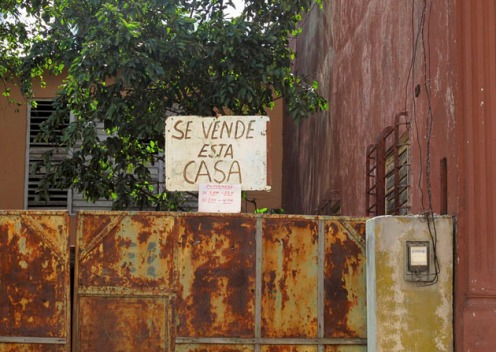Juan Juan Almeida, 7 December 2015 — During one of his famous tantrums, General Raul Castro shamelessly ordered a review of all the paperwork related to the sale of nine private homes as well as investigations into their new owners.
The Office of Personal Security got to work and the public prosecutor intervened, seizing some twenty homes. The same chain of command also closed two private restaurants in prime locations which had been leased from the state-run company Palco for of 3,000 CUC a month.
It has been said — and this is gossip, so I do not know if it is true or not — that one of the restaurants, located near Fifth Avenue and 68th Street, was closed because Alex Castro, Fidel’s photographer son, had commercial interests and was trying to get permits.
But, as I said, this has not been confirmed. The fact is that the actions by the district attorney’s office have created a firestorm that they are now trying to put out. To calm things down, Samuel Rodiles, a special envoy and the current director of the Institute of Urban Planning, and Miguel Gomez, director of Havana’s Collective Buffets corporation, have appointed an attorney to handle the case.
An appeal is being heard in order to, as many believe, quiet things down. But the well-known female attorney with the beautiful legs, angelic name and iron will claims otherwise.
“This is not a trial involving the public prosecutor, she claims. “It is an administrative issue, a civil matter. There has been no illegality, no crime. What has been done is an injustice. Currently, there is a housing law allowing for the sale and purchase of houses and property. If the owner is a Cuban citizen or permanent resident alien named Juaniquito Perez and the deed confirms that the owner is Juaniquito, then there is no irregularity. So what is the problem?”
The pending process promises to be long and complicated. The prosecution claims that the actual owners are not Cuban and that property deeds indicate that Cubans are serving as fronts for Italian, Russian, Chinese and Spanish buyers.
But the young and experienced jurist argues that the confiscations are groundless and is demanding that the properties be returned and that those affected be compensated. She also points out, with thinly veiled sarcasm, that “if Raul Castro does not like the new neighbors, he should move or change the law.”
The issue could have consequences. Two Urban Reform Laws in 1960, and two General Housing Laws (1984 and 1988), along with an infinite number of resolutions, circulars and rules of lower standing, long rules by “apolitical” Cuban real estate until, in 2011, the Decree Law Number 288/2011 marked a radical change on repealing the major constraints in the area of the right to personal property (please, do not confuse private property with personal property).
Although legislative change is always welcome, Cuba still retains a stunted system of civil law. There is a huge disconnect between reality and the registry office. Some urban areas have been declared special zones or areas of special significance related to “national security” based on their proximity to houses or routes used by Fidel or Raul. The property registry office is completely cut off from reality. It has been overhauled not to fulfill its intended purpose but to meet the government’s demands that it present a positive appearance to foreign investors.
This case has caused new Cuban investors to lose faith in the security and credibility of the system. They legally purchased or leased property and are now on the verge of eviction. All of the confiscated homes were duly registered. The act of sale was legal and the corresponding taxes were paid on each property. These were formal, legal transactions conducted in compliance with new government-imposed regulations. Where is the illegality?
As repeated ad nauseam by my unbearable professor of Procedural Law: “The worst case scenario is when the law exists, but does cover it.”

